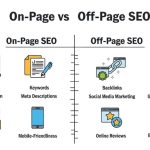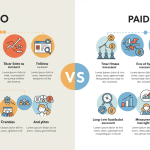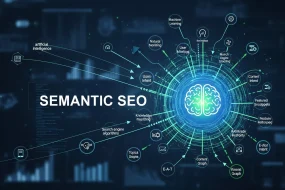SEO continues to evolve through AI-driven search, user intent prioritization, and experience-based rankings. Future success depends on content quality, technical performance, brand authority, and adaptability. Businesses that focus on helpful, trustworthy, and well-structured content—while integrating SEO across channels—will achieve sustainable visibility and long-term growth in an increasingly competitive search landscape.

Search engine optimization continues to evolve at breakneck speed, with Google rolling out algorithm updates, new AI features, and shifting ranking factors that can make or break your website’s visibility. If you’re planning your digital marketing strategy for the months ahead, understanding what’s on the horizon for SEO becomes crucial for staying competitive.
The landscape of search has transformed dramatically over the past year alone. From the rise of AI-powered search experiences to Google’s continued emphasis on helpful, people-first content, the rules of the game keep changing. This means your SEO strategy needs to be both adaptable and forward-thinking.
Algorithm Updates and Core Changes

Google’s algorithm updates remain one of the biggest wildcards in SEO planning. Based on historical patterns and recent announcements, expect to see continued refinements to Google’s helpful content system throughout the year.
The search giant has made it clear that content quality will remain a top priority. Sites that publish thin, AI-generated content without human oversight are likely to face penalties. However, websites that use AI as a tool to enhance genuinely helpful content—rather than replace human expertise—should continue to perform well.
Core Web Vitals will maintain their importance as ranking factors, but Google is refining how these metrics are measured. Page experience signals are becoming more sophisticated, with new emphasis on visual stability and interaction responsiveness across different device types.
Mobile-first indexing is now the standard, but Google is pushing further into mobile usability as a ranking factor. Websites that provide exceptional mobile experiences will gain competitive advantages, while those that treat mobile as an afterthought will likely see their rankings suffer.
The Rise of AI in Search Results
Artificial intelligence has fundamentally changed how people search and how Google responds to queries. AI-powered search features are expanding beyond simple question-and-answer formats into more complex, conversational experiences.
Search generative experience (SGE) testing continues to evolve, though full rollout timelines remain uncertain. Early data suggests that websites appearing in AI-generated responses often see increased click-through rates, but the competition for these spots is intensifying.
Voice search optimization becomes increasingly important as smart speakers and mobile voice assistants improve their accuracy. Long-tail keywords and natural language patterns will play bigger roles in content strategy.
Featured snippets are evolving to include more dynamic content types. Video snippets, interactive elements, and real-time data are becoming more common in search results, creating new opportunities for websites that can provide comprehensive, multimedia answers to user queries.
Content Strategy Evolution
Content remains king, but the definition of quality content continues to shift. Google’s emphasis on Experience, Expertise, Authoritativeness, and Trustworthiness (E-E-A-T) means that content creators need to demonstrate real-world knowledge and credibility.
Topical authority is becoming more important than individual keyword optimization. Websites that build comprehensive coverage around specific subject areas tend to outperform those with scattered, unrelated content. This trend suggests that content clustering and pillar page strategies will become even more valuable.
User engagement metrics are playing larger roles in rankings. Time on page, bounce rate, and user interaction signals help Google understand whether content truly satisfies search intent. This means creating content that genuinely helps users accomplish their goals becomes more important than ever.
Original research and unique data sources provide significant competitive advantages. As more content becomes commoditized through AI generation, websites that offer exclusive insights, surveys, or proprietary data will stand out in search results.
Technical SEO Priorities
Core Web Vitals optimization remains critical, but the focus is shifting toward more nuanced performance improvements. Largest Contentful Paint (LCP), First Input Delay (FID), and Cumulative Layout Shift (CLS) will continue to influence rankings, but Google is also looking at overall user experience quality.
Schema markup implementation becomes increasingly sophisticated. Rich snippets and structured data help search engines understand content context better, leading to improved visibility in specialized search features like product carousels, event listings, and FAQ sections.
International SEO considerations are growing more complex as search engines better understand regional differences and cultural nuances. Hreflang implementation, local content adaptation, and region-specific optimization strategies require more attention.
Security and privacy features are becoming baseline requirements rather than competitive advantages. HTTPS implementation, cookie policies, and data protection measures are expected standards that can negatively impact rankings if neglected.
Local SEO and Business Visibility

Local search continues to evolve with more personalized and location-specific results. Google Business Profile optimization becomes increasingly important for businesses of all sizes, not just traditional brick-and-mortar establishments.
Review management strategies need to become more sophisticated as Google places greater weight on review quality, recency, and response rates. Businesses that actively engage with customer feedback and maintain high review standards will see better local search performance.
Local content creation offers significant opportunities for businesses targeting specific geographic markets. Community-focused content, local partnerships, and region-specific resources can help establish local authority and improve regional search visibility.
Preparing Your SEO Strategy
Flexibility becomes the most important characteristic of successful SEO strategies. Rather than betting everything on specific tactics, diversifying your approach across multiple channels and techniques provides better long-term stability.
Content audit and optimization processes should become regular routine activities rather than one-time projects. Regularly reviewing and updating existing content helps maintain relevance and can provide better returns than constantly creating new material.
Technical monitoring tools and regular site audits help identify issues before they impact rankings. Proactive technical SEO maintenance prevents small problems from becoming major ranking obstacles.
Competitor analysis and industry monitoring help identify emerging opportunities and potential threats. Understanding what works for similar websites in your industry provides valuable insights for strategy refinement.
Search Intent Becomes the Primary Ranking Signal
Search engines are moving beyond keywords and focusing more deeply on user intent. Google now evaluates whether content truly satisfies what users are trying to accomplish. Informational, navigational, transactional, and commercial intents must be clearly addressed within content. Pages that partially answer a query or misalign with intent are losing visibility. To stay competitive, businesses must analyze SERP behavior, understand why users search specific terms, and structure content accordingly. Clear headings, intent-focused formats, and concise answers improve satisfaction signals. As intent interpretation becomes more accurate through AI, aligning content purpose with user expectations will be critical for ranking success.
Helpful Content Updates Will Intensify
Google’s helpful content system continues to evolve, targeting low-value and unoriginal pages. Websites relying heavily on mass-produced AI content without editorial oversight are increasingly vulnerable. The focus is shifting toward content usefulness, depth, and originality. Pages created primarily for rankings rather than people are more likely to decline. Businesses must prioritize real expertise, firsthand experience, and practical insights. Updating outdated articles, improving clarity, and removing redundant pages will become essential. Long-term SEO success depends on publishing content that genuinely solves problems, answers questions thoroughly, and reflects real-world knowledge rather than surface-level summaries.
E-E-A-T Signals Will Influence Competitive Niches
Experience, Expertise, Authoritativeness, and Trustworthiness (E-E-A-T) are becoming increasingly important, especially in YMYL (Your Money, Your Life) industries. Google evaluates author credibility, brand reputation, and content accuracy more rigorously. Demonstrating real experience through case studies, author bios, citations, and transparent sourcing strengthens trust signals. Businesses should showcase qualifications, customer success stories, and verifiable data. As misinformation concerns rise, authoritative brands will outperform anonymous or poorly attributed content. Building trust is no longer optional—it is a foundational requirement for sustainable SEO growth.
AI Search Experiences Will Reshape Visibility
AI-powered search results are changing how users interact with Google. Features like AI summaries and conversational search experiences reduce reliance on traditional blue links. This means fewer clicks for generic content and greater rewards for high-value, unique insights. Websites included in AI-generated responses benefit from increased visibility and authority. To adapt, content must be well-structured, factually accurate, and comprehensive. Clear definitions, step-by-step explanations, and authoritative language improve AI inclusion chances. SEO strategies must now account for visibility beyond rankings, focusing on how content is interpreted and reused by AI systems.
Zero-Click Searches and SERP Saturation
Zero-click searches are increasing as Google answers queries directly within search results. Featured snippets, knowledge panels, AI summaries, and local packs reduce the need for users to click through to websites. This trend challenges traditional traffic-focused SEO but opens new visibility opportunities. Brands must optimize content to appear within these enhanced SERP features by providing concise, structured, and authoritative answers. Clear formatting, bullet points, schema markup, and strong entity signals increase eligibility. While organic clicks may decline, brand exposure and trust can grow. SEO strategies must now measure visibility, impressions, and assisted conversions—not just traffic.
Entity-Based SEO Over Keywords
Search engines increasingly understand topics as entities rather than isolated keywords. Google connects people, brands, places, and concepts through its Knowledge Graph. This means optimizing for topical relevance and semantic relationships is more effective than keyword repetition. Businesses should focus on entity mentions, internal linking, and contextual relevance. Creating content that clearly defines who you are, what you do, and how you relate to your industry strengthens entity authority. Consistent brand signals across websites, social profiles, and citations reinforce search engine understanding and improve long-term rankings.
Content Refreshing Becomes a Ranking Advantage
Refreshing existing content is becoming as important as publishing new pages. Google rewards updated, accurate, and relevant information, especially for evergreen topics. Content refreshes can improve rankings faster than new content creation. Updating statistics, improving readability, expanding sections, and aligning with current search intent significantly boosts performance. Regular content maintenance also prevents ranking decay caused by outdated information. Businesses that implement structured update schedules gain sustainable SEO advantages while reducing content production costs.
UX Signals Influence SEO Performance
User experience is tightly connected to search rankings. Google evaluates how users interact with pages, including readability, navigation clarity, and task completion ease. Poor layouts, intrusive popups, and confusing design reduce engagement signals. Optimizing page structure, improving content scannability, and minimizing distractions enhance satisfaction. Websites that prioritize usability retain visitors longer and send stronger positive signals to search engines. SEO and UX are no longer separate disciplines—they must work together to deliver meaningful results.
Visual Search Optimization Gains Momentum
Visual search tools like Google Lens are changing how users discover content. Images are no longer decorative—they are searchable assets. Optimizing images with descriptive filenames, alt text, and structured data improves discoverability. High-quality visuals also increase engagement and accessibility. Businesses should treat visual content as a strategic SEO component, particularly for ecommerce, real estate, fashion, and local businesses where visual context drives decision-making.
Video SEO Becomes Essential

Video content continues to dominate SERPs, especially for tutorials, reviews, and product explanations. Google increasingly displays video carousels and timestamps. Optimizing video titles, descriptions, transcripts, and structured data improves rankings. Hosting videos on YouTube and embedding them strategically enhances visibility. Businesses that invest in educational and explanatory video content gain competitive advantages, especially as video answers align well with AI-generated search results.
First-Party Data and SEO Alignment
As third-party cookies decline, first-party data becomes critical. SEO strategies must align with content that encourages subscriptions, downloads, and engagement. Search traffic should support audience building rather than one-time visits. Email lists, gated content, and value-driven resources strengthen long-term marketing performance. Search visibility combined with owned audience channels ensures stability regardless of algorithm shifts.
Your SEO Success Roadmap
The SEO landscape will continue to change rapidly, but websites that focus on providing genuine value to users while maintaining technical excellence will thrive regardless of specific algorithm updates. Success comes from balancing user needs with search engine requirements rather than trying to game the system.
Start by auditing your current SEO performance and identifying areas where your website already excels. Build upon these strengths while systematically addressing weaknesses in content quality, technical performance, and user experience.
Remember that SEO success is a marathon, not a sprint. Consistent effort toward improving your website’s value to users will ultimately drive better search performance than any short-term optimization tactics. Focus on creating the kind of website that you would want to find when searching for information in your industry.
Conclusion
SEO is evolving faster than ever, driven by AI, user intent, and experience-focused algorithms. Success no longer depends on isolated tactics but on holistic strategies that prioritize value, credibility, and adaptability. Businesses that invest in quality content, technical excellence, and audience trust will remain competitive despite constant change. SEO is no longer about chasing rankings—it is about earning relevance.
Frequently Asked Questions (FAQ)
1. How often should SEO strategies be updated?
SEO strategies should be reviewed quarterly and adjusted as algorithms and user behavior evolve.
2. Is AI content safe for SEO?
Yes, when used responsibly with human editing and expertise.
3. Do Core Web Vitals still matter?
Yes, they remain important for rankings and user experience.
4. How long does SEO take to show results?
Typically 3–6 months, with stronger results over time.
5. Is keyword research still important?
Yes, but intent and topical relevance matter more than exact matches.
6. Can SEO work without backlinks?
Backlinks still matter, but quality content and engagement also play key roles.
7. Does content length affect rankings?
Depth and usefulness matter more than word count.
8. How does AI search affect organic traffic?
It reduces generic clicks but rewards authoritative content.
9. Is local SEO still effective?
Yes, especially for service-based and location-focused businesses.
10. Should businesses focus on new or existing content?
Both, but optimizing existing content often delivers faster results.
11. What is the biggest SEO mistake to avoid?
Creating content for search engines instead of users.


















No Comments